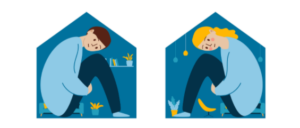Ideas & Interventions That Work
It has been a while since I have written. I have been very busy treating kids and teens, working with families and speaking to groups all over the world. When I thought to write I would feel a sense of overwhelm as I questioned where I would even begin. This pandemic has had numerous consequences beyond physical health. The economic, educational, employment and mental health toll that it has taken is enormous.
Children who may have had pre-existing stress, worries and sadness are at higher risk of now being burned out, lacking focus, feeling lonely, isolated, anxious and or depressed. In the worst of cases, children and teens are contemplating suicide and we know that ER visits for mental health emergencies began rising in April of 2020.
I get asked daily what parents can do to help. We talk about their particular situation and together we problem solve. But recently, I was struck by a pediatrician who called me to ask what to tell his patients. He said that the amount of depression screenings that he is conducting on a daily basis has nearly doubled. So, we spent some time discussing some ideas that may be helpful and I thought I would share them with you all.
1. Social Connection- easily one of the most important things you can do for your kids is figure out a way for them to safely socialize and connect. Staying connected with one friend, a group of friends, or new online friends is key to to their mental health. For fun, fresh ideas on how to do this you can check out this Washington Post article that I contributed to last month.
| 2. Focus on Future- we could likely all use something to look forward to. Inspire your child with planning a trip, a visit or an event. Anything beyond their current rote routines could be helpful in reminding them that this state of being won't last forever and that there is hope and change slowly coming. |
| 3. Quality time- because families are spending increased physical time together they can mistaken that for quality time, which often it is not. This is a reminder to check in daily with your child on how they are really doing and plan on things to do together. Taking the dog on a walk, watching a show together, completing a puzzle or playing a board game are all great ways to connect and well worth the investment on the new for hobbies and activities that are intended only for fun. 4. Nature & Movement- we know that the best way to complete a Stress Cycle is through movement. Stress is stored in your body, so physical activity is the most productive way to work through it. Just 20 minutes a day, 5 days a week has been shown through studies to decrease stress. Getting outside, getting sunshine and moving is something that many parents don't feel they can make their children do but it is key to their mental and physical health. 5. Sleep- throughout the pandemic, many kids have been staying up late, on screens much of the day, eating less quality meals and having quite disrupted sleep. It is going to be part of the adjustment period when their lives get back on predictable routines to assure that a sleep hygiene regime becomes a part of their lives again. Many critical things happen during sleep including brain development, physical growth and psychological processing that protecting and restoring good sleep is essential to maintaining positive mental health. It is important for us all to remember that while we are in this same storm we are all traveling through it in different boats. Communicate with your child, be present, practice self-care and spend some time each day focusing on something in the future that you can look forward to. Happy Parenting. |
